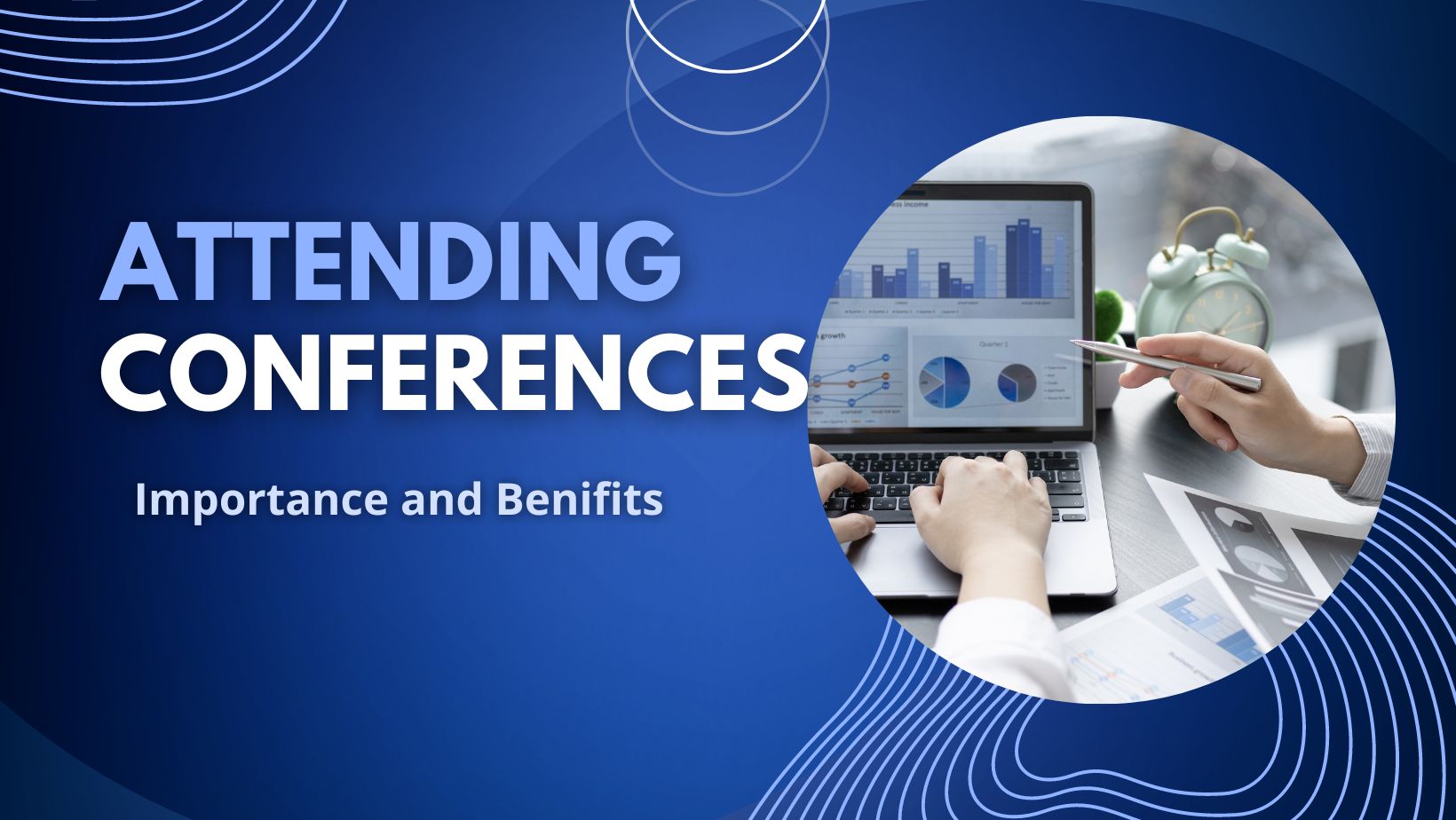Importance of Attending Conferences

30 May 2023

Conferences: Enriching Knowledge, Fostering Collaboration, and Advancing Careers
Attending conferences has become an increasingly important aspect of academic and professional development for students. These gatherings bring together experts, researchers, and students from various institutions and disciplines, creating a vibrant environment for knowledge sharing, networking, and collaboration. The concept of attending conferences extends beyond mere participation; it represents a proactive approach towards expanding one's horizons, staying abreast of the latest advancements, and engaging with peers who share similar passions and interests.
Conferences are pivotal events in academia and professional development, where experts, researchers, and students convene to exchange knowledge, ideas, and foster collaboration. These gatherings provide a platform for individuals to present their research, engage in discussions, and expand their network. With a diverse range of presentations, workshops, and panel discussions, conferences offer a rich and immersive experience, enabling participants to stay up-to-date in their fields and contribute to the advancement of knowledge. Attending conferences not only provides opportunities for networking and collaboration but also allows individuals to enhance their presentation skills, refine research methodologies, and establish a professional identity within the academic community. Conferences serve as vibrant hubs of intellectual discourse, connecting individuals with shared interests and inspiring new perspectives. They create an environment where attendees can showcase their work, receive feedback, and gain recognition for their academic achievements. Moreover, conferences offer practical workshops and training sessions that equip participants with valuable skills applicable to their research projects. By actively engaging in conference activities, individuals can broaden their horizons, expand their critical thinking abilities, and contribute to the collective advancement of their careers and fields of study.
Idea in Brief
Attending conferences is an essential aspect of a student's academic and professional journey. It offers them a platform for knowledge acquisition, skill development, and exposure to the wider academic community. By actively participating in conferences, students can expand their knowledge, refine their skills, build valuable relationships, and contribute to the advancement of their field. The experiences gained from attending conferences serve as catalysts for personal and professional growth, positioning students for success in their future endeavors.
Networking and Collaboration
Networking and collaboration are integral components of attending conferences, offering students valuable opportunities to connect with professionals, researchers, and peers within their field of interest. Firstly, conferences provide a platform for students to expand their professional network. They can engage in conversations and establish connections during coffee breaks, poster sessions, and networking events. These interactions can lead to meaningful relationships with individuals who can provide guidance, mentorship, or even open doors to future career opportunities. Building a strong network allows students to tap into a broader community of experts and peers, enhancing their access to resources, knowledge, and potential collaborations.
Secondly, conferences foster collaborative efforts among attendees. By interacting with individuals from different institutions and backgrounds, students can identify shared research interests and explore possibilities for collaboration. Collaborative projects can involve joint research studies, sharing of resources and expertise, or co-authoring research papers. Engaging in collaborations not only expands the scope and impact of their work but also allows students to learn from the diverse perspectives and skills of their collaborators, fostering a richer and more comprehensive research experience.
Thirdly, attending conferences facilitates the exchange of ideas and the formation of interdisciplinary partnerships. Conferences often attract researchers from various disciplines, presenting an opportunity for students to explore innovative approaches and interdisciplinary perspectives. Engaging in interdisciplinary discussions can inspire new research directions and collaborations that bridge the gaps between different fields. By networking and collaborating with individuals from diverse backgrounds, students can contribute to the broader academic community, promoting interdisciplinary research and advancing knowledge in new and exciting ways.
Skill Development
Attending conferences provides students with valuable opportunities for skill development, allowing them to enhance various abilities that are crucial for their academic and professional growth. Firstly, conferences offer platforms for students to refine their presentation and communication skills. Many conferences provide opportunities for students to present their research findings or projects to an audience of peers and experts. This experience not only helps students effectively communicate complex ideas but also improves their ability to engage and captivate an audience. By receiving feedback and constructive criticism, students can refine their presentation techniques and develop confidence in presenting their work.
Secondly, conferences often feature workshops, seminars, and training sessions that focus on developing specific skills. These sessions may cover topics such as data analysis techniques, research methodologies, academic writing, or technical skills relevant to a particular field. Students can actively participate in these sessions to acquire practical knowledge and enhance their expertise. Acquiring new skills or improving existing ones enables students to conduct their research more effectively, analyze data accurately, and produce high-quality academic work.
Thirdly, attending conferences fosters critical thinking and problem-solving skills. Conferences provide an environment where students can engage in intellectual discussions, attend panel discussions, and explore new perspectives. By actively participating in these discussions and engaging with experts in their field, students are exposed to a wide range of ideas and viewpoints. This exposure stimulates critical thinking and encourages students to analyze and evaluate information from different angles. The ability to think critically and solve problems creatively is highly valuable in both academic and professional settings.
Exposure and Recognition
Attending conferences provides students with significant exposure to the academic community and offers opportunities for recognition, enabling them to showcase their work and receive acknowledgment for their efforts. Firstly, conferences serve as platforms for students to present their research findings, projects, or innovative ideas. These presentations allow students to disseminate their work to a diverse audience of peers, experts, and researchers in their field. By sharing their research, students gain exposure and receive valuable feedback and suggestions for further improvement. This exposure not only helps them refine their work but also provides an avenue to gain recognition for their contributions to their respective fields.
Secondly, conferences often feature poster sessions or exhibitions where students can showcase their research visually. These sessions allow attendees to explore the research displayed in a more interactive and engaging manner. Presenting research through posters or interactive displays can attract the attention of fellow researchers, experts, and potential collaborators, further enhancing the exposure of students' work. Moreover, during these sessions, students have the opportunity to engage in one-on-one discussions with interested individuals, opening doors for valuable connections and potential collaborations.
Thirdly, conferences may offer awards, scholarships, or recognition programs to honor outstanding contributions in research or academic excellence. These accolades can provide students with prestigious recognition within their field and enhance their academic profile. Winning an award or receiving recognition at a conference not only validates students' hard work and dedication but also positions them as emerging leaders and contributors in their respective areas of study. This recognition can have a positive impact on their academic and professional journey, opening doors to further opportunities, such as scholarships, internships, or invitations to contribute to future conferences or publications.
Embracing Conferences: Empowering Growth and Advancement
In conclusion, attending conferences is a vital aspect of academic and professional development for students. Conferences provide a rich platform for knowledge sharing, networking, and collaboration, allowing students to expand their horizons, refine their skills, and establish themselves as contributors within their fields. By actively participating in conferences, students gain exposure to the latest advancements, receive valuable feedback on their research, and engage in thought-provoking discussions with experts and peers. The networking opportunities offered by conferences enable students to build a professional network, opening doors to mentorship, collaborations, and potential career opportunities. Additionally, conferences foster skill development, enhancing students' presentation, communication, critical thinking, and problem-solving abilities. Moreover, attending conferences offers students exposure and recognition for their work, enabling them to showcase their research, gain visibility within the academic community, and receive acknowledgment for their contributions. Overall, embracing the concept of attending conferences empowers students to grow personally and professionally, contributing to the advancement of knowledge and their own academic and career journeys.

